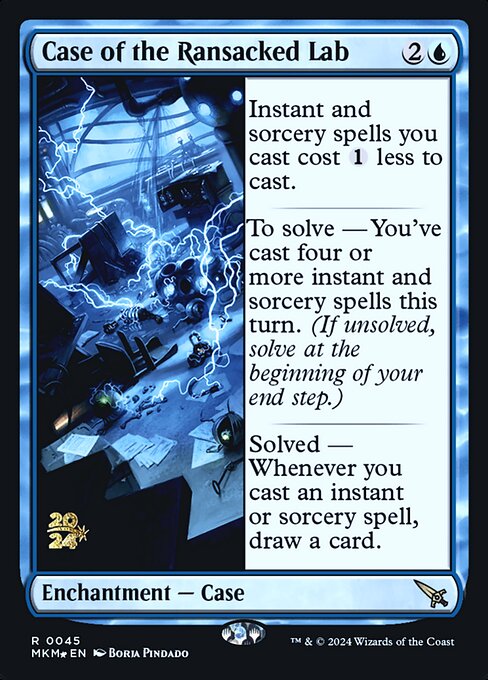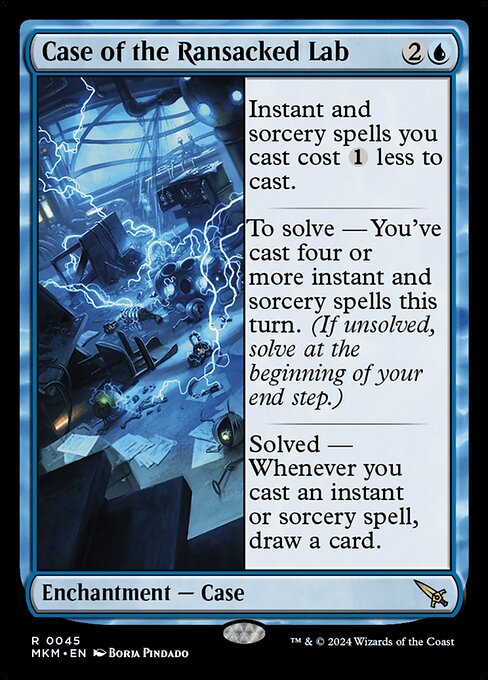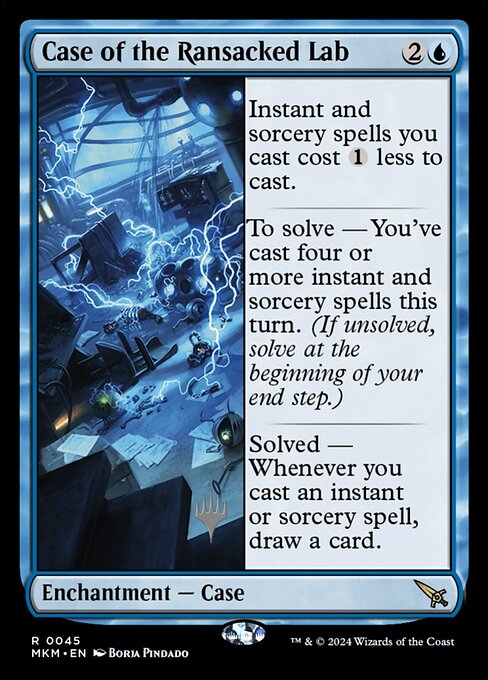Affaire du laboratoire pillé
Enchantement — affaire
Les sorts d'éphémère et de rituel que vous lancez coûtent de moins à lancer.
À résoudre — Vous avez lancé au moins quatre sorts d'éphémère et de rituel ce tour-ci. (Si l'affaire n'est pas résolue, résolvez-la au début de votre étape de fin.)
Résolue — À chaque fois que vous lancez un sort d'éphémère ou de rituel, piochez une carte.
À résoudre — Vous avez lancé au moins quatre sorts d'éphémère et de rituel ce tour-ci. (Si l'affaire n'est pas résolue, résolvez-la au début de votre étape de fin.)
Résolue — À chaque fois que vous lancez un sort d'éphémère ou de rituel, piochez une carte.
standard
future
historic
gladiator
pioneer
explorer
modern
legacy
pauper
vintage
penny
commander
brawl
alchemy
paupercommander
duel
oldschool
premodern
Rulings
Cases don’t lose their other abilities when they become solved.
“To solve” abilities will check for their condition twice: once when the ability would trigger, and once when it resolves. If the condition isn’t true at the beginning of your end step, the ability won’t trigger at all. If the condition isn’t true when the ability resolves, the Case won’t become solved.
Once a Case becomes solved, it stays solved until it leaves the battlefield.
“To Solve — [condition]” means “At the beginning of your end step, if [condition] and this Case is not solved, it becomes solved.”
“Solved — [Triggered ability]” means “[Triggered ability]. This ability triggers only if this Case is solved.” Triggered abilities use the word “when,” “whenever,” or “at.” They’re often written as “[Trigger condition], [effect].”
“Solved — [static ability]” means “As long as this Case is solved, [static ability].” Static abilities are written as statements, such as “Creatures you control get +1/+1” or “Instant and sorcery spells you cast cost less to cast.”
Each Case has two special keyword abilities: to solve and solved.
The meaning of “solved” differs based on what type of ability follows it. “Solved — [activated ability]” means “[Activated ability]. Activate only if this Case is solved.” Activated abilities contain a colon. They’re generally written “[Cost]: [Effect].”
Being solved is not part of a permanent’s copiable values. A permanent that becomes a copy of a solved Case is not solved. A solved Case that somehow becomes a copy of a different Case stays solved.
“To solve” abilities will check for their condition twice: once when the ability would trigger, and once when it resolves. If the condition isn’t true at the beginning of your end step, the ability won’t trigger at all. If the condition isn’t true when the ability resolves, the Case won’t become solved.
Once a Case becomes solved, it stays solved until it leaves the battlefield.
“To Solve — [condition]” means “At the beginning of your end step, if [condition] and this Case is not solved, it becomes solved.”
“Solved — [Triggered ability]” means “[Triggered ability]. This ability triggers only if this Case is solved.” Triggered abilities use the word “when,” “whenever,” or “at.” They’re often written as “[Trigger condition], [effect].”
“Solved — [static ability]” means “As long as this Case is solved, [static ability].” Static abilities are written as statements, such as “Creatures you control get +1/+1” or “Instant and sorcery spells you cast cost less to cast.”
Each Case has two special keyword abilities: to solve and solved.
The meaning of “solved” differs based on what type of ability follows it. “Solved — [activated ability]” means “[Activated ability]. Activate only if this Case is solved.” Activated abilities contain a colon. They’re generally written “[Cost]: [Effect].”
Being solved is not part of a permanent’s copiable values. A permanent that becomes a copy of a solved Case is not solved. A solved Case that somehow becomes a copy of a different Case stays solved.
Rulings
Cases don’t lose their other abilities when they become solved.
“To solve” abilities will check for their condition twice: once when the ability would trigger, and once when it resolves. If the condition isn’t true at the beginning of your end step, the ability won’t trigger at all. If the condition isn’t true when the ability resolves, the Case won’t become solved.
Once a Case becomes solved, it stays solved until it leaves the battlefield.
“To Solve — [condition]” means “At the beginning of your end step, if [condition] and this Case is not solved, it becomes solved.”
“Solved — [Triggered ability]” means “[Triggered ability]. This ability triggers only if this Case is solved.” Triggered abilities use the word “when,” “whenever,” or “at.” They’re often written as “[Trigger condition], [effect].”
“Solved — [static ability]” means “As long as this Case is solved, [static ability].” Static abilities are written as statements, such as “Creatures you control get +1/+1” or “Instant and sorcery spells you cast cost less to cast.”
Each Case has two special keyword abilities: to solve and solved.
The meaning of “solved” differs based on what type of ability follows it. “Solved — [activated ability]” means “[Activated ability]. Activate only if this Case is solved.” Activated abilities contain a colon. They’re generally written “[Cost]: [Effect].”
Being solved is not part of a permanent’s copiable values. A permanent that becomes a copy of a solved Case is not solved. A solved Case that somehow becomes a copy of a different Case stays solved.
“To solve” abilities will check for their condition twice: once when the ability would trigger, and once when it resolves. If the condition isn’t true at the beginning of your end step, the ability won’t trigger at all. If the condition isn’t true when the ability resolves, the Case won’t become solved.
Once a Case becomes solved, it stays solved until it leaves the battlefield.
“To Solve — [condition]” means “At the beginning of your end step, if [condition] and this Case is not solved, it becomes solved.”
“Solved — [Triggered ability]” means “[Triggered ability]. This ability triggers only if this Case is solved.” Triggered abilities use the word “when,” “whenever,” or “at.” They’re often written as “[Trigger condition], [effect].”
“Solved — [static ability]” means “As long as this Case is solved, [static ability].” Static abilities are written as statements, such as “Creatures you control get +1/+1” or “Instant and sorcery spells you cast cost less to cast.”
Each Case has two special keyword abilities: to solve and solved.
The meaning of “solved” differs based on what type of ability follows it. “Solved — [activated ability]” means “[Activated ability]. Activate only if this Case is solved.” Activated abilities contain a colon. They’re generally written “[Cost]: [Effect].”
Being solved is not part of a permanent’s copiable values. A permanent that becomes a copy of a solved Case is not solved. A solved Case that somehow becomes a copy of a different Case stays solved.
Votre collection ? vos decks ?
Envie de gérer votre collection et/ou créer des decks ?



 0
0
 0.53€
0.53€
